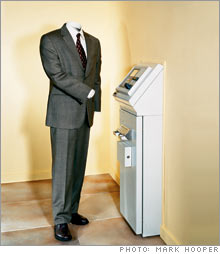 |
|
|
|
|
| The odds of ID theft |
FEAR
Chance that you'll be a victim of high-tech identity theft 1 in 200.
Sources: Federal Trade Commission, Javelin Strategy Research
|
REAL DANGER
Chance that your credit report contains an error 7 in 10.
Source: Federal Reserve
|
WHAT TO DO
Get three free credit reports a year. That's an easy, cost-effective way to protect against errors and ID theft.
|
|
|
|
|
NEW YORK (MONEY Magazine) -
If the thought of a hacker selling your Social Security number to the Russian mob via some Internet hidey-hole sends you into a panic, you're not alone. Identity theft pushes a lot of fear buttons.
It's mysterious: We don't know who or where the threat comes from. We're exposed involuntarily: Data tapes fall off trucks and employees steal disks filled with credit-card numbers. And we lose control of a precious asset: our good name.
Reality: The really scary thieves-leading-our-lives stuff rarely happens. Far more common is garden-variety credit-card fraud that stems from everyday security breaches like lost wallets or checkbooks or, worse, personal information swiped by family or friends. In most of those cases, your losses, if any, will be small and the inconvenience minor. (So don't bother with ID theft insurance.)
A bigger danger than thieves wrecking your credit rating? Your credit rating being wrecked by accident. A 2003 Federal Reserve study of 250,000 credit reports found that 70 percent contained mistakes.
A 2004 U.S. Public Interest Research Group analysis of 200 reports found that 79 percent had mistakes and 25 percent contained serious errors, such as false delinquencies or accounts that didn't belong to the consumers, that could result in a denial of credit.
What to do
Leave ID you don't need at home. "The absolute worst piece of information that can get out is your Social Security number," says Avivah Litan, an ID theft expert with Gartner Inc. So never carry it on you. And don't give it out unless absolutely necessary.
Monitor your credit -- for free. You're entitled to a free report from each of the three major credit rating agencies every year. Ignore the ads for FreeCreditReport.com, not to mention the spammy come-ons that keep appearing in your e-mail inbox.
Instead, go to www.annualcreditreport.com. Use that service to hit one agency every four months and you'll stay on top of your financial info.
If something's amiss, tell the reporting agency -- in writing -- what's inaccurate (see "Money Helps") and send your claim via certified mail with return receipt requested. The agency has 45 days to investigate. So fear the cyberthieves no more.
NEXT: Stupid number tricks
________________________
Click here for Money's special report on ID theft.

|
